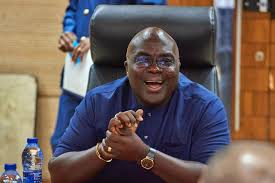The Chief of Staff, Mr. Julius Debrah has heaped praises on the National Health Insurance Authority (NHIA) Governing Board and Executive Management’s transformational leadership.
He cited the formation of the Illegal charges (co-payments) National and Regional Taskforces, established for clamping down some recalcitrant credentialled healthcare facilities management, demanding cash payments from the National Health Insurance Scheme (NHIS) active members at the point of need.
The Chief of Staff delivered the key note address of the Vice President, Professor Jane Naana Opoku Agyemang at the opening ceremony of the NHIA’s maiden Stakeholder Conference held in Accra on Tuesday, October 28, 2025.
The two-day conference was themed, “Consolidating Strategic Partnerships for a Resilient and Inclusive Health Insurance Scheme.”
The event aimed at strengthening collaboration and consolidating strategic partnerships for a more resilient and an all-inclusive NHIS.
Among the participants were stakeholders in the health sector from the Ministry of Health, Ghana Health Service, Christian Health Association of Ghana (CHAG), Private Health Facilities Association of Ghana, World Health Organization(WHO), Parliamentary Select Committee on Health, policymakers, traditional leaders, NHIA staff, and directors.
Mr. Julius Debrah commended the Authority’s “zero-tolerance campaign against illegal charges,” stressing that the persistent practice of unauthorized payments popularly called co-payments, threatens the very foundation of the NHIS.
“These illegal fees, often demanded at the point of need, undermine the purpose of the scheme. They erode public trust, deepen inequality, and place undue burden on the poor and vulnerable.”
He noted that while co-payments may be legitimate in some jurisdictions, they are not recognized under Ghana’s NHIS.
He emphasized that the introduction of a national Co-payment Taskforce, replicated at the regional and district levels, was a “vital intervention” to investigate and recommend lasting solutions to the problem.
Mr. Debrah also called for intensified public education to correct misconceptions about the scheme and to increase membership.
“Let us go beyond our offices into communities, schools, churches, mosques, markets, and lorry parks to educate Ghanaians about the scheme’s benefits. Public awareness is our best defense against exploitation.”
The Chief of Staff used the platform to highlight two forthcoming government health initiatives aimed at complementing the NHIS, the Ghana Medical Care Trust Fund (Mahama Cares) and the Free Primary Health Care Programme.
According to him, the Mahama Cares Fund will finance treatment for major diseases such as kidney failure, cancer, diabetes, hypertension, and sickle cell disease.
The Free Primary Health Care initiative, he explained, will focus on disease prevention, early detection, and treatment, particularly in underserved communities, with the goal of reducing out-of-pocket spending and improving access.
“Together, these initiatives will expand the reach of the NHIS, especially for low-income and vulnerable populations. We are investing in health not just as a right, but as a driver of national development.”
He announced that the government had uncapped the National Health Insurance Levy, releasing an additional GHC 3.4 billion into the NHIS fund in 2025. He said this move had already begun to yield results in the form of rapid claim payments and enhanced provider confidence.
“As of today, the total amount of funds disbursed by NHIA to healthcare providers this year stands at GHC 2.8 billion. This timely injection of funds is increasing provider confidence, encouraging compliance, and driving enrolment growth.”
Mr. Debrah lauded the NHIA leadership for instituting a prompt payment regime, describing it as a vital step that strengthens the scheme’s credibility and sustainability. He also commended the Authority’s efforts to digitalize and reform the claims processing system, making it more robust and transparent.
He underscored the importance of collaboration among stakeholders, including faith-based institutions, civil society, development partners, the media, and the public in consolidating efforts to achieve Universal Health Coverage (UHC) by 2030.
He urged participants to leave the conference with a renewed sense of purpose and a clear roadmap to restore public confidence in the scheme and boost membership beyond the 21 million targets for 2025.
“Let us recommit ourselves to consolidating strategic partnerships for a resilient and inclusive national health insurance scheme and together combat the menace of illegal charges once and for all.”


Comments are closed.